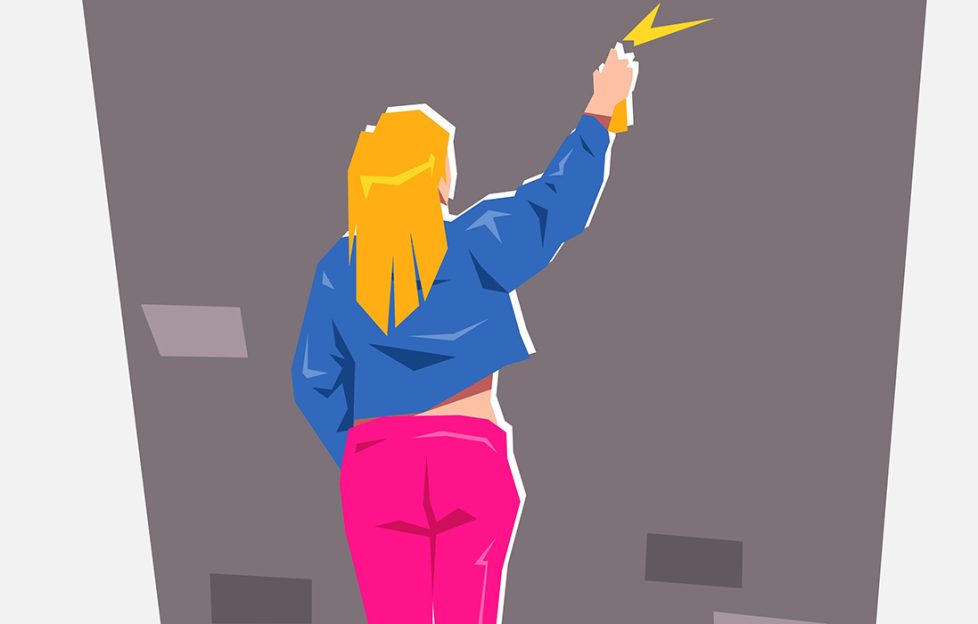A Brush With The Law

AN UPLIFTING SHORT STORY WRITTEN BY CHRISTINE SUTTON
Suzanne’s brand of social justice painted a clear picture for the community…
Suzanne Miles closed her front door and eased her tartan shopping trolley down the steps. Her little dog, Rags, trotted after her. He was getting used to these night time excursions. Suzanne checked the sky, cloudless now after the welcome rainstorm of earlier in the evening, with a full moon and a million stars.
A mixed blessing. Good visibility for what she had in mind, but easier for her to be spotted doing it.
“All set to ruffle some feathers, Rags?” she whispered. The spaniel wagged his tail and Suzanne smiled. “Off we go.”
The houses were, without exception, all in darkness, their occupants doubtless dreaming the dreams of the guilt-free at two in the morning. She pulled up the hood of her cagoule to cover her blonde hair and donned the purple-framed glasses she’d found in a charity shop.
So far this had proven a good disguise, adding years to her actual twenty-six. Reports of a shadowy figure captured on CCTV, pulling a trolley and with a small dog trotting beside them, had been discounted by the police as some “unfortunate person seeking shelter for the night”.
The real culprit, they felt, was likely to be a streetwise youth agile enough to skim over walls and savvy enough to avoid the cameras.
The assumption suited Suzanne fine.
Her route took her past several of her old haunts.
The senior school where she’d spent maths lessons gazing out of the window, wishing the view was anything other than the gymnasium’s plain brick wall.
The library where she’d spent hours poring over books and wondering why so few others were making use of this wonderful free facility.
The bank she’d worked in for seven years after leaving college, following her father’s advice that there was no money to be had in art, while resenting every minute spent counting other people’s.
All three places had received the “Smiler” treatment over the past few months. Now it was the turn of the abandoned toilet block in the park.
Suzanne enjoyed the walk along the high street. With the pubs and fast food places closed, there was nothing to taint the air. The fragrance of night-scented stocks and damp earth was delicious.
Turning into the park, she cut across the grass, weaving between oaks and willows as she headed for the old building by the cricket pavilion.
Both entrances were boarded up, awaiting the refurbishment the council had never got round to doing. Anyone needing to use it now faced a lengthy walk into town to avail themselves of the supermarket’s facilities.
Suzanne bent to unclip Rags’s lead.
She took out her materials, all the paints and brushes plus the sketch she’d drawn at home. This would be one of her simplest images, amusing hopefully, but with an unmistakable message intended to shake the councillors into action. With the moon peeking curiously over her shoulder, she set to work.
Two hours later, she was done. She ran a critical eye over her creation, a picture of two halves. There was no mistaking what lay behind the woman’s pained expression, as she stood, knock-kneed and with her hands clamped in front of her on the padlocked door to the right, while the elderly gentleman to the left was cross-eyed and pucker-lipped with agony.
These were people in dire need of the very facility that the council had seen fit to close, providing no public alternative.
She could only hope they would generate the same sort of debate her earlier efforts had done. The letters page in the local paper had reflected their readers’ interest with a mixed bag of opinions. Some felt that the graffiti brightened up some otherwise dreary facades.
One mother had written:
My daughter is a pupil at the school. She says the waterfall mural on the wall of the sports hall is soothing. And her grades have definitely improved since it appeared.
Others were less positive, calling the artworks an eyesore.
“The financial decisions of a bank manager are not a subject for ridicule,” one had ranted in response to the gimlet-eyed, moustachioed man Suzanne had painted looming over a customer clutching a begging bowl with LOAN written across it.
“To liken such a responsible figure to a cartoon villain is a disgrace and the perpetrator should be made to scrub off every last disrespectful daub – with a toothbrush.”
“Criminal damage,” another had blasted, referring to her painting on the library’s facade. “Who gave this person permission to defile our public buildings this way?”
While Suzanne hadn’t expected unbridled praise, the negativity had stung. Her aim had been to throw a little light on things, while having a gentle dig at the powers that be where necessary.
It was her visit to the dogs’ home that had set her on this course. The sight of those hopeful little faces looking up at her from their pens had melted her heart.
She’d chosen Rags because of his imploring brown eyes, but the memory of the others had stayed with her. A week later she’d set off in the dead of night to leave a hint for passers-by of what lay behind that high brick wall. The image she’d painted couldn’t have been simpler – two furry paws curled over the edge of a barred window, with a shiny black nose just visible between.
Days later a photo had appeared in the local paper with the question, Who is the Mystery Artist?
And so, it began.
The following month, she’d created an old-style horse-drawn tram on the wall of the bus depot, exactly like the one her great-grandfather had driven, to commemorate its centenary. Next had come a hand-cranked camera on the side of the town’s much-loved but soon to be demolished art deco cinema.
Eight months on, this was her twelfth outing. It would also be her last. She needed to focus on trying to earn some money from her art, because this was bringing her nothing.
She was about to add her finishing touch when she heard a discreet cough. A woman was standing a few feet away, looking straight past Suzanne to her artwork.
She nodded thoughtfully.
Humour this time, a new tack for you.
Suzanne said nothing, since no question had been asked. The woman came closer. She was short and plump, with a petrol-blue streak running through the fringe of her coal-black hair.
“You were about to add your moniker – please, don’t let me stop you.”
With a flourish, Suzanne flicked the brush over the corner of each picture. It was these upturned lips, a play on her name, S. Miles, that had prompted the newspaper to dub her “Smiler”.
Rags stirred from his folded blanket and came to check the new arrival.
“I suspect you’re what started all this, eh, boy?” She glanced up from stroking him, as if seeking confirmation.
“That picture on the dogs’ home gate certainly made its mark,” she went on when Suzanne didn’t respond.
“Several readers sent donations, and when I interviewed the manager she said that re-homings are up. You are making a difference.”
“You’re from the paper?” Suzanne blurted, unsure whether to feel relieved or alarmed.
“Yes. Peggy Lucas. I’ve been covering the story. After what you did to the library wall, our postbag went crazy. People loved it. Dickens and Shakespeare holding open the doors, with Agatha Christie inside ready to welcome people. Absolutely inspired.”
“But the letter you printed called it criminal damage,” Suzanne protested, remembering the wording all too well.
“A poor editorial decision in my opinion,” Peggy told her regretfully.
“It was one of your early ones and my editor felt we couldn’t be seen to condone what you’d done.
The letter-writer was one of our regular complainers. Every newspaper has them. Speed bumps, unrepaired potholes, staggered school hours, he moans about the lot. The rest were full of praise. Did you know that library membership has shot up?
“Really?” Suzanne said, ridiculously pleased. “That’s brilliant.”
Peggy fished in her backpack and took out a flask.
“I’m guessing you could use this,” she said, pouring out a steaming cup of coffee. Suzanne accepted it gratefully, wrapping her hands around the warmth.
“Thank you. How did you know I’d be here?”
“I didn’t,” Peggy said. “As the story grew, I became more intrigued. I started coming out a couple of nights a week, just walking around hoping to spot you. The one that really interested me was the bank. Did something trigger that?”
Suzanne drained the cup and handed it back.
“I worked at that branch for seven years,” she said in a low voice, “but all the time I wanted to be an artist.
“I’d exhibited a few times, made a few sales, so I took the plunge and left to see if I could make a go of it.
“Six months on I felt confident enough to go back to ask for a loan to set up a studio. Unfortunately, the old manager had retired. The new one turned me down.”
“That must’ve hurt,” Peggy said quietly.
“Your work’s wonderful, so varied. Have you considered magazine illustration? You can obviously work to a theme.”
“Isn’t that all done in-house?” Suzanne asked, intrigued by the suggestion.
“Not so much these days. My sister’s the fiction editor on a mag, and I emailed her a few of your pictures. She really liked your style. I can send you her details if you like.”
Before she could answer, Suzanne heard a crunch of footsteps and a policeman came striding along the path.
“Good evening, ladies,” he beamed.
So, the mystery is solved. We’ve found our phantom artist.
Peggy laughed. “Yes, Phil. If these don’t get Councillor Drake pulling his finger out, I don’t know what will.”
Suzanne swallowed, wondering if she was about to be arrested.
“So, uh, what happens now?”
The policeman shrugged.
“You pack up your things and head home, I guess. I’ll ‘find’ this in an hour or two and report in.”
“Oh, but –”
“No buts,” Peggy chided. “I learned a long while ago it’s pointless to argue with this one.”
She planted a kiss on his cheek. He met Suzanne’s bewildered gaze.
“My wife,” he said, with a smile.
“Ah, right.” Suzanne bent and swiftly packed away her paints, then scooped up Rags.
“Well, it’s been lovely meeting you, Peggy, and thanks for the coffee.”
“You’re welcome,” Peggy said, “and if you’re interested in that magazine work, give me a call. Laura’s keen to have a chat.”
“I’ll do that, thank you.” Suzanne looked down at Rags. “Well, boy, I think we’ve just had our first brush with the law. It’s also going to be our last. Come on, let’s go home.”




